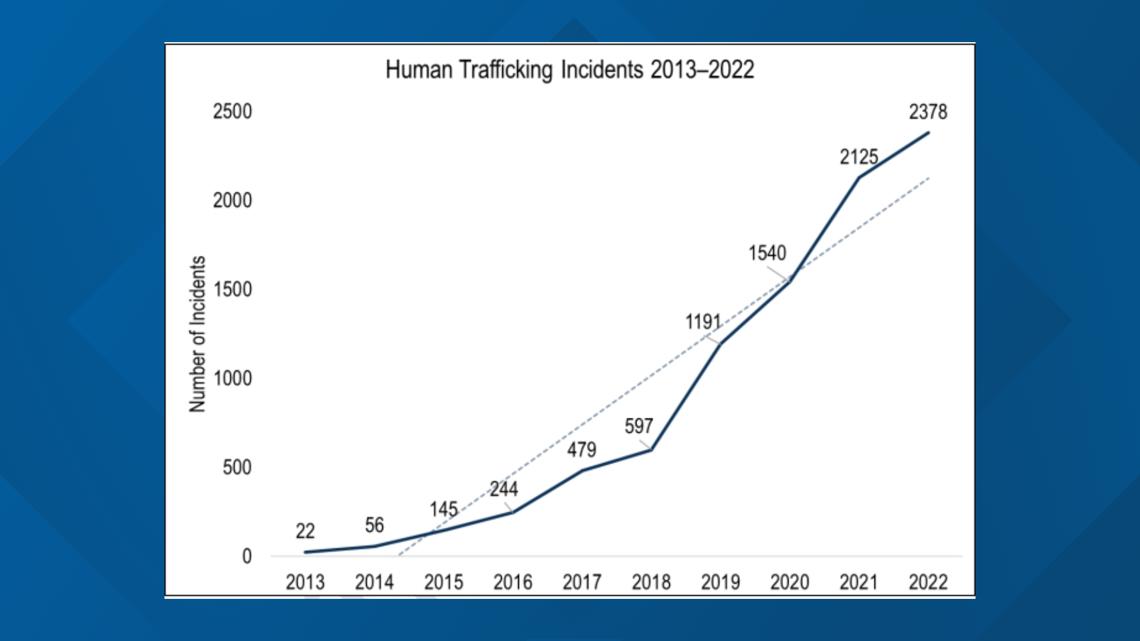ATLANTA — On "World Day Against Trafficking in Persons," the FBI released data it collected through the agency's Uniform Crime Reporting (UCR) Program pertaining to human trafficking and drug offenses.
The FBI breaks up the country into four regions: Midwest, Northeast, South and West.
A new report released by the FBI on Tuesday shows the South region has the highest number of reported human trafficking cases.
The South region includes: Alabama, Arkansas, Delaware, Florida, Georgia, Kentucky, Louisiana, Maryland, Mississippi, North Carolina, Oklahoma, South Carolina, Tennessee, Texas, Virginia and West Virginia.
The report highlights the high number of drug offenses associated with human trafficking cases. The top three reported drugs seized during human trafficking investigations are marijuana, amphetamines/methamphetamines and cocaine.
The FBI said according to the Drug Enforcement Administration (DEA), suspects often use drugs as "bait" to recruit victims who may have a substance abuse problem.
As 11Alive had previously reported, traffickers will oftentimes force their victims to take drugs to keep control over them while selling them to multiple people.
The FBI points out, traffickers are not always physically violent at least in the beginning. As we've seen in cases across metro Atlanta, they typically will groom individuals to lure them in where they then force them into dark world.
Oftentimes, traffickers will manipulate their victims with fake promises, such as money or even romantic relationships. Many times, victims are looking for some type of need in their life. The FBI points out, traffickers will use those vulnerabilities to subdue, coerce and control their victims.
The FBI said from 2013 to 2022, more than 8,700 reported incidents involved human trafficking. Some believe the numbers may not show just how big of a problem the issue is across the country.
That is because for non-federal law enforcement agencies, participation in the FBI's UCR Program is voluntary. However, federal law enforcement agencies are mandated to report.
Even on a voluntary basis, the FBI has seen the number of reported human trafficking cases increase since they first started collecting data in 2013.


The FBI said the most common age ranges of victims recovered in human trafficking cases range between 13-16 and 17-19-year-olds.
Based on reports the FBI received, around 80% of human trafficking victims were female.
The report said between 2013-2022, more than 10,000 victims of human trafficking were reported to the bureau's UCR Program. Again, only federal law enforcement agencies are mandated to report so this doesn't include victims recovered by every local or state agency across the country.
As far as the report, the FBI is making sure traffickers know they are coming after them.
"As of last week, we currently have over 1,600 active human trafficking cases we are investigating," Jenna Sellitto, the FBI public affairs specialist, said.
In 2023 alone, the FBI opened 664 human trafficking investigations across their 56 field offices. This does not include ongoing local and state investigations.
Sellitto hopes by better educating parents, it will help in the fight against human trafficking.
"Most of the time, it's coercion," she explained, adding that "teenagers are meeting these suspects online."
She said in many instances the victims think they're going to start a romantic relationship with the suspect or go off and live a better life but in reality they're being manipulated into sexual exploitation.
Some of the indicators to keep an eye out for are the following:
- Poor living conditions
- Letting someone speak for them, appear to be coached
- Frequent missing incidents or running away
- Signs of abuse
- Unexplained gifts
- Frequent absence from school
- Withdrawing from previously enjoyed activities
- Abrupt disconnection from family and friends
"Be on the lookout for signs of this happening," Sellitto explained.

